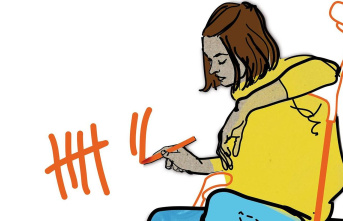PROPERTY TAX 2022. The amount of property tax will explode this year for owners. How to explain it? What increase? All the answers to your questions.
[Updated April 6, 2022 5:17 PM] How much can owners expect in 2022? This question is enough to worry the 32 million French tax households subject to property tax regulations this year. And for good reason, the revaluation of the cadastral rental values which serve as the basis for the calculation of the property tax coupled with the rise in inflation cast serious doubts on its amount. The method of calculating property tax has changed and is now indexed to inflation. Bad luck, France has been facing galloping inflation for several months (4.5% in March over twelve rolling months). The bill is therefore likely to be steep for owners this year.
For example, the city of Dijon should observe an increase of 5% in 2022, up to 15% increase in Tours or Amiens. But the increases do not stop there for 2022. Municipalities and intermunicipalities have also decided to increase their rates. An increase that can be justified by heavy investments in roads, cycle paths or energy renovation works. The abolition of the housing tax from next year is also pushing certain municipalities to bail out the coffers and compensate for a considerable shortfall.
Property tax is a local tax that affects property owners. Its amount depends on your situation on January 1 of the tax year, which means that you are still liable for property tax on real estate, even if you sold it during the year. The calculation is made from the cadastral rental value and the rate voted by the community.
There is also the property tax on unbuilt properties. It is due by the owner or usufructuary of land on January 1 of the tax year. It is collected by the local authority (municipality or EPCI with its own taxation), on whose territory the land is located. There are permanent or temporary exemptions (under conditions).
Ever thought the bill was particularly salty this year? Expect the local tax to be even higher in the years to come! Property tax jumped 27.9% between 2010 and 2020, according to the National Union of Property Owners (UNPI). The fault of a revaluation of the cadastral rental values, which serve as the basis for the calculation of the property tax. These are indeed based on the rental market conditions of the 1970s! The tax authorities are therefore updating them. A reform has been initiated, the first effects of which should be particularly felt from 2026. Another element to bear in mind: the rate voted by the municipality. Local authorities will no longer be able to count on the revenue generated by the housing tax, which has been abolished for main residences. Logically, the property tax rate should therefore increase, an additional element that will weigh in the years to come.
Property tax jumped 27.9% between 2010 and 2020, according to the National Union of Property Owners (UNPI). This very strong increase is attributed to the revaluation of the cadastral rental bases, which serve as the basis for the calculation of local tax and the rates voted by local authorities. These values are currently undergoing a renewal, as they are based on rental market conditions in the 1970s. In detail, some cities are particularly affected:
“It is no longer necessarily the property tax as such that increases, but all the satellite taxes [like the TEOM]”, explains Pierre Hautus of the UNPI to Parisian. "Over the decade, it's three times more than inflation or the increase in rents. It's huge," says Christophe Demerson, president of the National Union of Property Owners, in the columns of the Ile-de-France daily. . "We must be aware of what is happening in parallel with the abolition of the housing tax. Local authorities create or increase the rates of small taxes such as the Gemapi tax".
Stunned upon reading your property tax notice? You are not alone. If the local tax rates remain substantially identical to last year in the majority of large cities is the firm FSL, for other municipalities, it's a cold shower. Increase in the municipal or inter-municipal share, increase in the household garbage collection tax (TEOM)... Some cities have a heavy hand compared to previous years. For some owners, this increase translates into an additional hundred euros compared to their property tax last year. Want to know what the property tax rate is for you? Consult our dedicated file without further delay:
In theory, all owners of real estate are subject to property tax (land, apartment, house, etc.), whether it is their main residence or not. There are, however, two types of property tax exemptions: those that relate to taxpayers and those that relate to assets. To benefit from a total exemption from property tax, as a taxpayer, you must meet one of these conditions: you are a beneficiary of the disabled adult allowance (AAH); you are over 75; you hold Aspa or Asi (supplementary disability allowance).
If you are concerned, keep in mind that your reference tax income must not exceed a certain threshold. You must also respect so-called cohabitation conditions, explained here. As Le Particulier reminds us, the exemption does not apply to the household waste collection tax (TEOM), appearing on your tax notice. What about property? Any new construction or addition of construction allows you to benefit from an exemption from property tax for 2 years from January 1 of the year following the end of the work.
In detail, you must make a declaration to your public finance center within 90 days after the end of the work. As a reminder, this is the H1 declaration for a house and H2 for an apartment. Rural buildings for agricultural use are not affected by property tax. Be aware that some communities allow you not to be subject to property tax. This is the case if your home is energy efficient and you have carried out work to this end (which may give rise to partial or total exemption for 5 years) or if it is exposed to specific risks, for example . To find out about the property tax exemptions specific to your municipality, you should inquire at its public finance center.
If you want to know if you are potentially eligible for housing tax reform, a specific simulator is available by clicking here.
However, carrying out a pure and hard simulation of its property tax is not possible because of the too many criteria linked to the consistency of the property taxed.
Like housing tax, the calculation of property tax on built properties is based on two separate values. The first is the cadastral income. It corresponds to the cadastral rental value, reduced by a reduction of 50%. This value corresponds to the theoretical annual sum of rent that would have to be paid if the property were rented. It is established on the basis of ten criteria. Created from rental market conditions in 1970, cadastral rental values are intended to evolve, as they are now considered obsolete. The tax authorities thus carry out a review on a case-by-case basis. If your property has been expanded or modified, this value is subject to change. The rental value is then multiplied by the tax rate (read below), determined by the local authority.
The Taxe Foncière (TF) tax notice is usually available 3 weeks before the payment deadline of 15 October. If you have opted for the online opinion, an email is sent to you to inform you of the availability of your opinion in the "Documents" tab of your private space. In 2021, property tax notices are posted on August 30 for non-monthly taxpayers and September 20 for monthly property tax taxpayers. If you opt to receive the notice by paper, the property tax notice is sent by post during September if you are not monthly paid, at the end of October if you are monthly paid.
Although the exact payment dates for 2022 are not known, they should look very similar to the edited schedule for 2021. Here are the payment deadlines depending on your situation:
Beware. A word of advice, pay now without delay on the tax website, by logging in with your tax ID and password. In case of late payment, you expose yourself to a 10% increase in the amount of local tax. "The penalty applies if you have not paid your tax within 45 days of the collection date," it says on the public service site.
It is quite possible to monthly pay your local taxes, including property tax. Be careful however, for this, it is necessary to have a bank account or a booklet A, domiciled in France or Monaco. You have the possibility of monthly payment of your property tax until June 30 for the payment of your local taxes for the current year. Remember that the monthly payment is only valid for the following year. The tax for the current year must be paid via another means of payment.
The construction of a swimming pool increases the cadastral rental value of your property. Clearly, you risk seeing the amount of your property tax increase. "A swimming pool increases the amount of property tax by 5 to 10%," said Karl Toussaint du Wast, co-founder of Netinvestment with Capital. Keep in mind, however, that if you decide to build one, you can benefit from a property tax exemption for two years (read above).
If you are over 65 and under 75 on January 1 of the tax year, you can benefit from an automatic property tax relief and thus benefit from a reduction of 100 euros . Please note that your reference tax income must not exceed a threshold. The relief is automatically applied by the tax authorities. Subject to income conditions, a taxpayer liable for property tax can benefit from a ceiling.
"This system allows the taxpayers concerned to benefit from a reduction in their property tax contribution of more than 50% of their income", specifies Bercy on its site. You must submit a request for a ceiling, by completing form n°2041-DPTF-SD, here. Note that it is also possible to obtain a property tax reduction if your property, apartment or house is unoccupied. Be careful, you will have to provide supporting documents to the tax authorities.
In addition to the rates voted by local authorities, you must not omit a reform, which is often forgotten. Voted last year, the finance bill gave details on the reform of the property tax. The latter must allow the revision of the cadastral rental values - serving as a basis for the calculation of the local tax - which have become obsolete, because established from the conditions of the rental market in the 1970s. This reform is explosive. And for good reason, it could lead to a sharp increase in the amount of property tax.
Many people have already seen the effect of the revaluation: 130,000 households, according to the Minister of Action and Public Accounts in 2019. The Ministry of the Economy wanted to be reassuring and indicated that the effects of this reform will be "smoothed out over a long period" of several years. The first effects will not occur before 2026, could we read in the 2020 finance bill. Are you looking to find out what situations could allow you to reduce or even eliminate your local taxes? Consult our dedicated file without delay:
8












